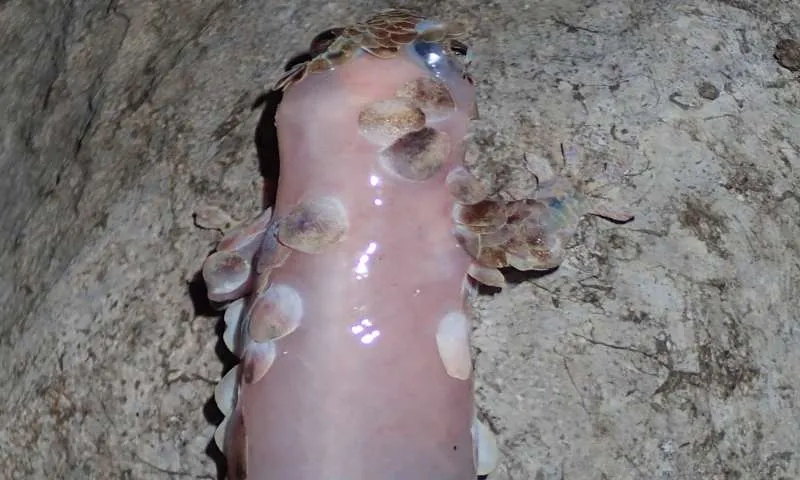New Species of Fish-Scaled Gecko Can (Literally) Jump Out of Its Skin
The creature sloughs its skin when predators attack, leaving it looking like a raw chicken tender
/https://tf-cmsv2-smithsonianmag-media.s3.amazonaws.com/filer/af/d3/afd33fa8-18ee-416b-9c1a-3321415132f3/new_gecko.jpg)
When a predator gets too close, many species of lizard are able to drop their tail to avoid becoming lunch. But a new species of gecko has a trick that one-ups its lizard brethren: tear-away skin and scales that rip off at the slightest provocation, reports Jen Viegas at Seeker.
Found in the limestone cliffs and caverns of northern Madagascar, researchers dubbed the new species Geckolepis megalepis. It is the first addition to the genus, also known as fish-scale geckos, in 75 years. Researchers describe their find this week in the journal PeerJ.
Similar to megalepis, other geckos in its genus lose scales when predators attack. This latest addition, however, not only has the largest scales of any known gecko, but it loses them more easily and thoroughly than other. And the naked geckos look a bit like a raw chicken tender.
“A typical predator encounter might start with the predator trying to grasp the lizard in its jaws or claws, triggering the scale sloughing, which ideally lets the gecko escape denuded but alive,” Mark Scherz, a doctoral student at Ludwig Maximilian University in Munich and lead author of the study, tells Viegas. “It then probably seeks a humid, safe place to hide while the scales regenerate, which happens in a few weeks,” Scherz adds.

Finding the new species turned out to be more CSI than Indiana Jones, Scherz explains in a press release. Until recently, researchers identified gecko species using scale patterns, leading them to believe there were only three or four species in the genus. But in 2013, researchers reanalyzed the group using genetic testing, which allowed them to distinguish as many as 12 different species of fish-scale geckos that may currently or once have existed.
As Michelle Z. Donahue at National Geographic reports, the discovery of so many more potential species of fish-scale gecko inspired Scherz to work out a better way to identify the creatures. Scherz used micro-CT scans to examine tiny differences in the geckos' anatomies, including the shape of their nasal bones and vertebrae, discovering that megalepis, first collected in 2004, was lumped in with the species G. maculata.
Surprisingly, the results also suggest that Geckolepis maculata did not belong to the genetic lineage researchers thought it was in. “This is just typical of Geckolepis. You think you have them sorted out, but then you get a result that turns your hypothesis on its head,” Scherz says in the press release. “We still have no idea what Geckolepis maculata really is—we are just getting more and more certain what it’s not.”
For the analysis, Scherz and his team collected fresh samples from Madagascar. But that’s no easy task when trying to get hold of a creature that drops it's scales at signs of threat. Researchers grab them using cotton or lure them into plastic bags, but rarely collect them without the loss of scales.
“I personally have only ever once managed to catch one of these geckos without losing more than a few scales,” Scherz tells Donahue. “I was elated! You can look at any museum with these geckos and you see how seldom the [skin] stays intact. It’s almost ridiculous.”
No matter the genetic relationship between the various species, the study is important for several reasons. The CT-scan shows that animal morphologists can study the anatomy of small animals without going through the tedious step of dissecting them. Also, their trick of sloughing their skin might have significance for humans. Viegas reports that their ability to bloodlessly drop their scales and regenerate them without scars could help researchers unlock regeneration in humans. According to the press release, scientists are already studying lizard tails and salamander limbs to understand those properties.